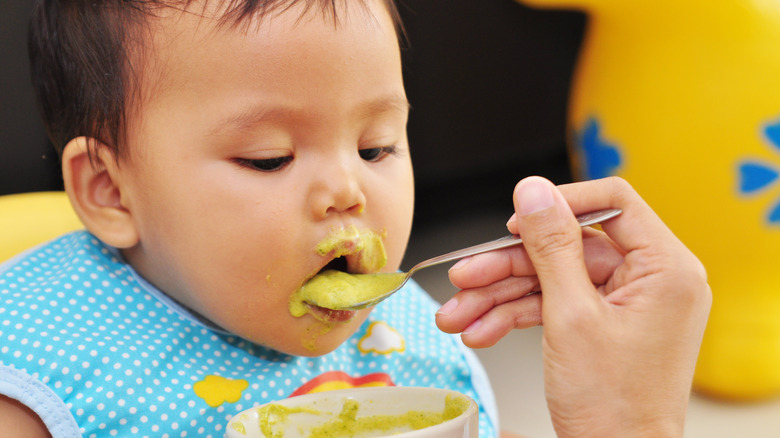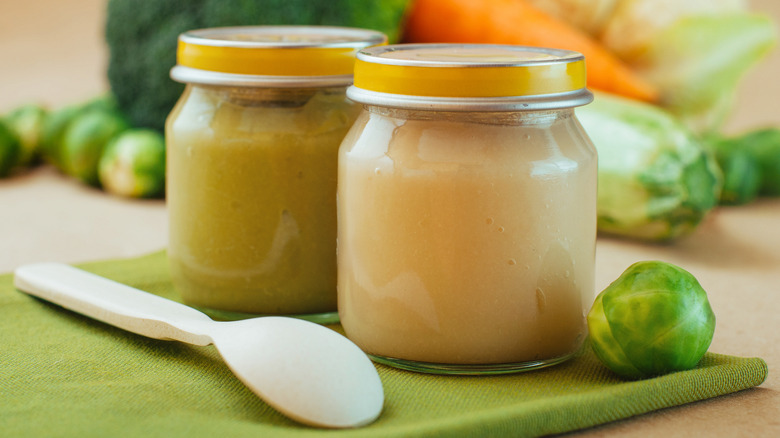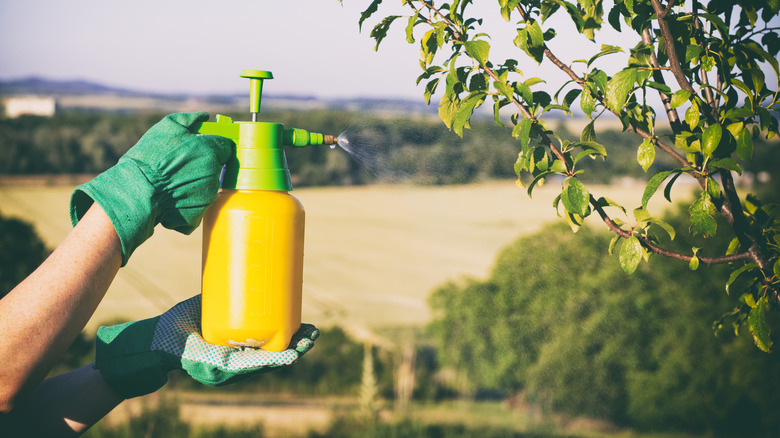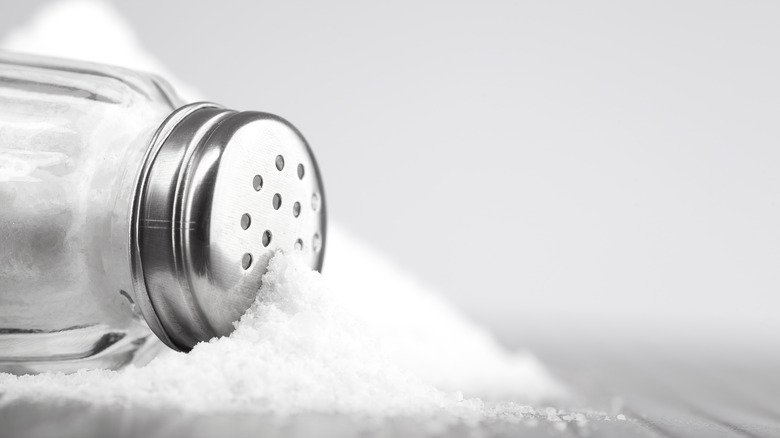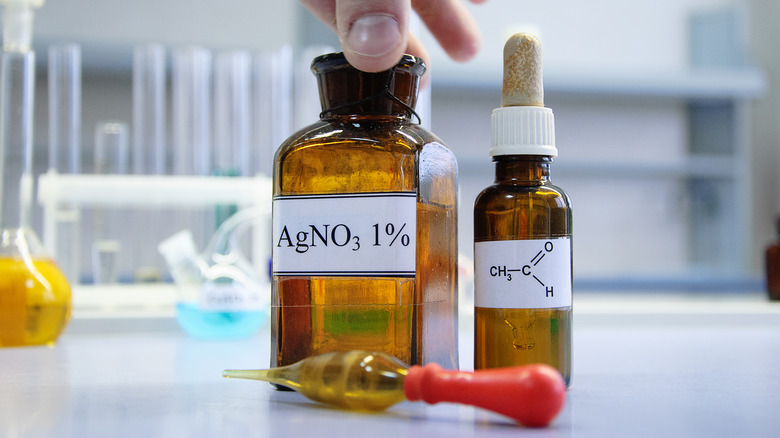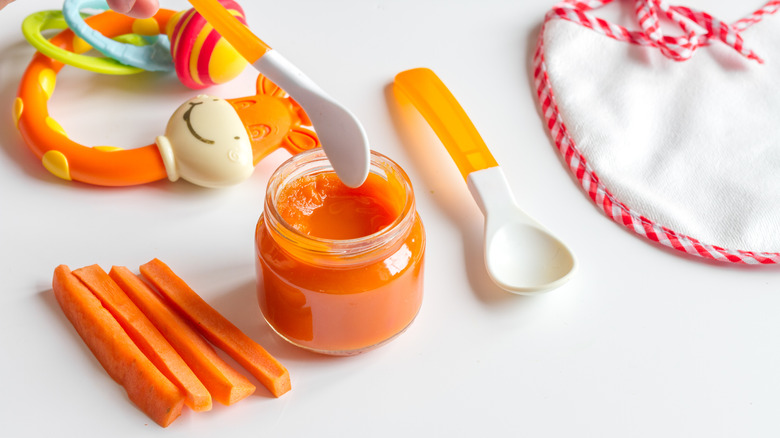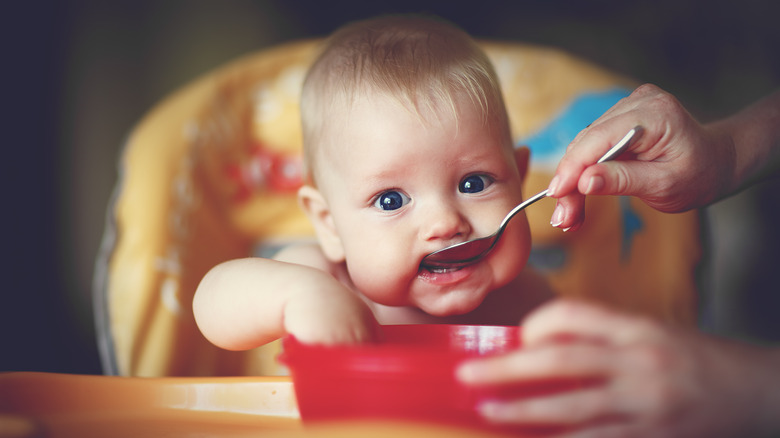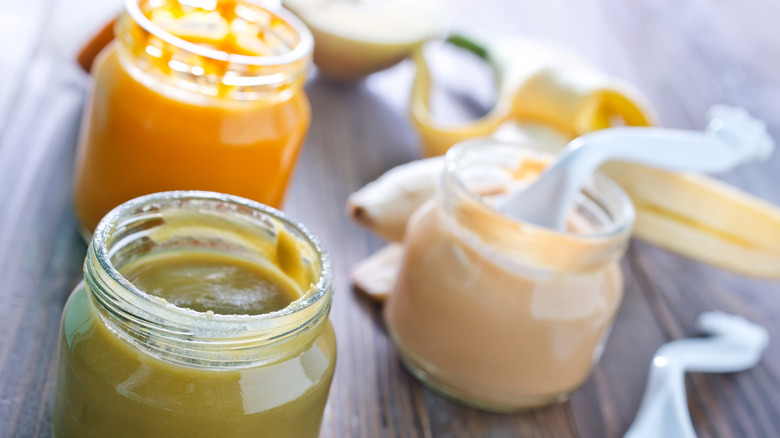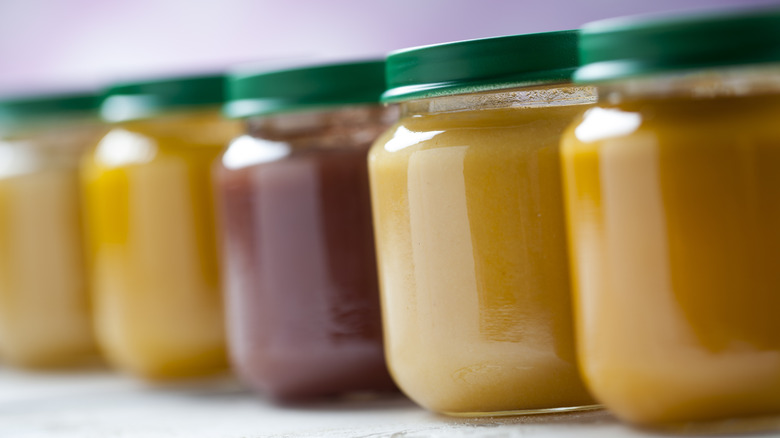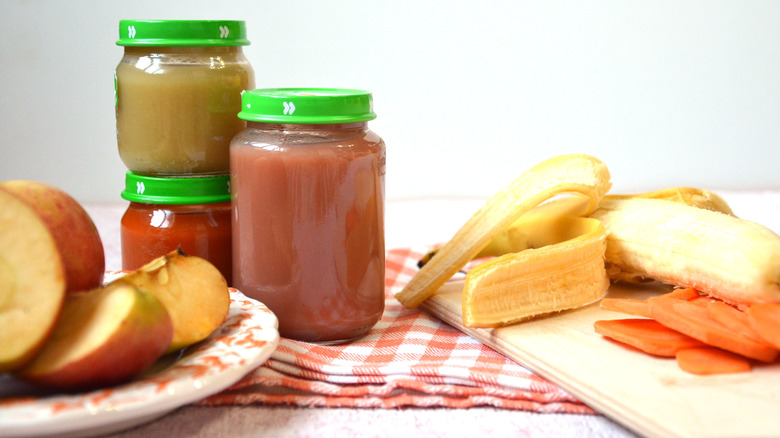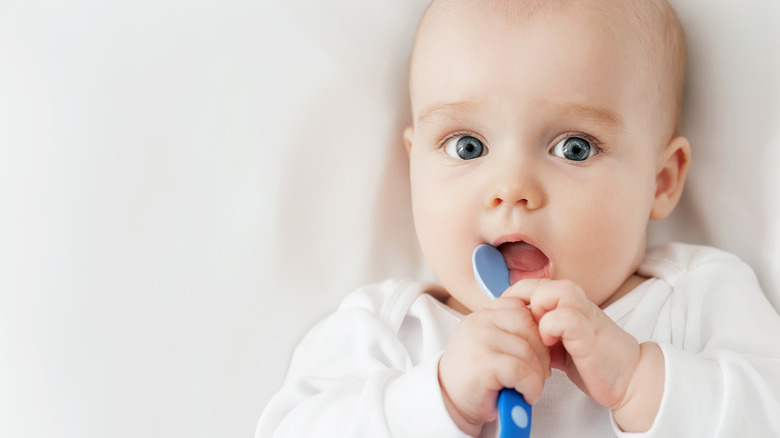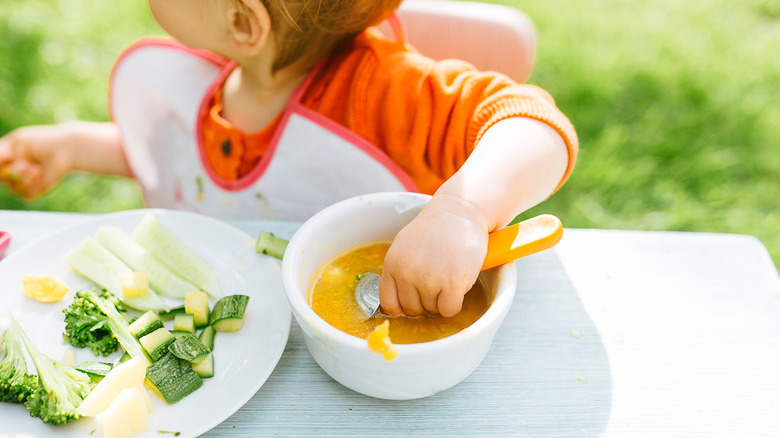The Untold Truth Of Baby Food
I love reading the untold truth of celebrities, reality shows, and my favorite stores, but baby food? What is so secretive about baby food? Turns out quite a bit.
Over the years, studies have found a huge variety of extra ingredients with everything from preservatives to pesticides to possible carcinogens making their way into our little ones' mashed peas. It's also amazing how much money and politics can affect our children's food. So if you think you know all there is to know about baby food, think again.
Watch out for preservatives
As a busy mom of two, I would love to prepare organic homemade baby food every day, but that is just not a reality for us, so I do my best to choose the safest and most nutritious store-bought foods. To all my fellow mamas buying their baby food, we're going to be okay. We just need to pay attention to the ingredients.
"Making your own is always best, because you control exactly what is in the food," Dr. Barry Sears, author of the Zone Diet book series and president of the non-profit Inflammation Research Foundation, told me. "The only risks with store-bought are usually the preservatives used to extend the shelf life and the restricted selections used based on cost. You have only one opportunity to establish the ideal foundation for a child's future health." It pays to be careful with labels.
One ingredient to watch out for is acrylamide. This compound can form in baby food as it cooks and has been found to be carcinogenic is higher doses. According to a study in Food and Chemical Toxicology, researchers tested acrylamide levels in a variety of baby food and found some in Poland that exposed infants to higher levels than adults are used to. If you're ever unsure of the type of baby food you're buying, talk with your pediatrician.
Beware of pesticides
You probably wouldn't buy fresh fruit that had high levels of pesticides, but we may be unknowingly buying it for our babies. A study in the International Journal of Environmental Analytical Chemistry reported that the pesticide residue found on the skins of fresh apples can also be found in processed apple baby foods. Some apple baby foods even exceeded the maximum allowed amount of pesticides for children!
If you go apple picking every fall, think about making your own applesauce and freezing it for you and your family to enjoy. If you don't have a ton of extra time to make homemade applesauce, look for organic baby foods at the store to avoid the pesticide concerns.
There is a political component
Unfortunately, not everyone is as concerned about your baby's health as you are, and some of those people control baby foods and prices. Laurie True, the former executive director of the California WIC Association and current director of the University of California Berkeley School of Public Health, has voiced concerns that baby food companies have been known to add ingredients that sound good in order to raise prices, but lack research to find out if these ingredients benefit our children's health. This becomes especially interesting when the government is forced to pay more for the WIC program's baby food.
"These include additives like DHA/ARA, 'probiotics,' and others, which are increasingly showing up in infant formula, baby food, juice, milk, eggs, bread, and other WIC-allowable items," True wrote in The Hill. "These 'value-added' foods are more expensive, and are heavily marketed as improving a baby's immunity, brain development, or digestion. However, there is no clear scientific consensus that they confer any health benefits to full-term infants or toddlers."
In fact, buying baby food and formula with these added "functional ingredients" costs the government an additional $90 million each year! It's important for consumers to continue to be on the lookout and question claims that aren't proven. Many of us remember a time when formula companies marketed their powdered formulas as better and healthier than mothers' breast milk. If there is no evidence to back up a baby food company's claim, we simply cannot accept it.
Watch the sodium
Just like any other canned or jarred food, baby food can be high in salt. However, because babies' bodies are so much smaller, it's crucial to monitor just how much salt they are taking in.
A study in Experimental Biology and Medicine found that the high sodium levels in baby food may be linked to hypertension or high blood pressure as an adult. Researchers fed traditional jarred baby food to rats who were predisposed to hypertension. All of the rats who ate the baby food developed hypertension, and half of them died or became critically ill.
Researchers voiced concern about the amount of sodium found in processed baby food. "This added [sodium] is unnecessary for the health of infants," researchers explained. "It may contribute to the later development of hypertension in genetically predisposed individuals." If hypertension tends to run in your family, consider making your own baby food to prevent health issues down the line.
It could be full of nitrates
As a health foodie, I know which foods to stay away from because of their nitrate levels. The nitrates in certain meats and other foods have been found to increase your risk for heart disease, because they can damage blood vessels. That means giving up some pretty delicious treats.
See ya later hot dogs. Sorry bacon, well on second thought, we can still see each other sometimes. However, I never thought about nitrates being in tiny jars of baby food. Researchers from the University of Iowa College of Medicine studied nitrate levels in store-bought baby foods. Study authors found that the baby foods most likely to contain nitrates were "mixed vegetables, bananas, carrots, garden vegetables, spinach, green beans, and beets."
There could be lead
When reading the studies that have found preservatives in baby food, it is hard to determine if these findings are concerning, or perhaps a tiny amount is normal and okay. However, when it comes to lead, it's safe to say that no amount in baby food is acceptable.
"Recently there was a study released where lead was found in 20 percent of baby foods sampled. No amount of lead is safe for infants," Registered Dietitian Nutritionist and mom of three Lindsey Carter told me. "This could be from plants absorbing it from contaminated soil and water, lead leaching into food via food processing equipment, or food may come into contact with lead-based paint in buildings during handling. Potentially making your own baby food at home could reduce lead exposure by reducing processing."
It could burn your baby
If your baby is a bit of a diva and refuses cold baby food, be careful when heating it up. The Food and Drug Administration recommends never microwaving baby food in the jar it came in. When heated, baby food will not heat evenly in the jar, leaving potential "hot spots" where your baby could burn her mouth.
When microwaving baby food, always transfer it to a clean dish. Then microwave it for about 15 seconds and always allow it to rest for at least 30 seconds. Stir well to avoid any hot spots and test it out first. Don't worry, you don't have to eat it. Just give it a temperature test. Safe baby food should feel lukewarm.
It's expensive!
If you have ever shopped for baby food, you were probably shocked at the prices the first time. One of those tiny jars is usually costs over a dollar, so once you start adding up how much your baby needs in a given day, week, or month, it's easy to see how fast your grocery bill will add up.
If you buy organic baby food, then you really know you're paying a premium. Studies have shown that parents are willing to pay more if they feel the food is healthier for their baby. When it comes to organic baby food, we're more likely to buy it when the jar advertises positive findings, like more iron, and takes away negatives, like no fillers.
Because the cost of baby food, especially organic, keeps rising, Carter recommends making your own. "The final benefit to making your own is it's less expensive, and your know exactly what you are feeding your baby," Carter told me.
Little jars, big business
Because baby food can be so expensive, it means big business. That money is going somewhere, and it's not just going to food giants like Gerber. Smaller companies are coming up in the market and becoming wildly successful.
Agatha Achindu quit her job at a Fortune 500 company and drained her 401K to start Yummy Spoonfuls. "It would only take an immigrant to do something like this," Cameroon-born Achindu told Fortune. "I took every penny out of our 401Ks. It was everything we had." Well, Achindu's gamble paid off. She broke into Target, and her products are now in over 1500 stores nationwide and growing!
How you store it matters
Making, jarring, and selling baby food can be a delicate process. During the cooking and sealing processes, there are chemical interactions that can affect the texture and safety of the food. It is vital that companies carefully monitor the entire environment. Everything from temperature to moisture levels during the process makes a difference.
Once you bring the baby food home from the store, make sure you are safely storing it. Check the top of the jar, and make sure you hear that "pop" when you open it. If the baby food has sat out in an open jar for over two hours, it's best to toss it. Never feed your baby food directly from the jar and then save the rest for later. Every time you dipped the spoon back into the jar, you introduced his little germs and saliva into the remaining food, and that could cause bacteria to grow.
Check for furan
Never heard of furan? I hadn't either, but after learning that this possible carcinogen has found its way into baby food, you better believe I'm now on the lookout. An article in Food Additives & Contaminants reported that when researchers tested over 230 baby food products, they found low levels of furan in the ones containing meat or vegetables.
According to researchers, the furan seems to form when the baby food is reheated in its original jar, so here's another reason to transfer it to a dish before heating.
It can stunt your child's development
As a parent, there is nothing easier than grabbing a pouch of baby food at the store. It is easy for babies to consume, cuts down on mess, and makes the drive home oh so peaceful. However, those pouches come with a downside. In addition to being higher in sugar than traditional baby foods, they rob your kids the chance to practice vital motor skills.
First, these pouches don't teach our kids how to feed themselves. "Food pouches are consumed through sucking, not chewing. Children need to learn how to eat," Pediatrician Dina Kulik wrote in the Huffington Post. "Simply sucking the goo out of a package skips out on a learning experience, and a whole range of oral skills can be bypassed because of this."
And while we parents love the no-mess factor, it's not all positive for the baby. "Children develop fine motor skills when they pick up their food and play with it," explained Dr. Kulik. "This is a vital part of learning about food and how to eat it." According to Dr. Kulik, pouches are fine sometimes, but don't rely on them for every meal.
It used to be made for adults
Are you ready for this? There was a time when high level executives sat in a conference room and thought to themselves, "Hey! Why don't we start making baby food for adults?" In 1974, baby food giant Gerber started making larger portions of baby food for single adults. As if constantly being asked when they were going to "settle down" weren't enough, single adults now had to face the fact that they weren't worth a real meal by themselves. Not surprisingly, this trend didn't last long, and Gerber pulled its adult jars.
However, that fad is coming back around. Replacing meals with baby food has become one of the latest celebrity diet secrets. Celebrities like Tracy Anderson and Camila Alves have credited their sleek bodies with eating several jars of baby food per day. However, like many celebrity fads, this one is not sustainable.
"Baby food is lacking adequate amounts of fiber, fat, and protein to sustain a healthy adult. This puréed, and often strained, food is created for babies with underdeveloped digestive systems," Cooking Light assistant nutrition editor Jamie Vespa, MS, RD told the magazine. "Keeping our digestive systems active by eating whole, nutrient-dense food is healthy for both our gut and our immune system. The 'baby food diet' is a gimmicky, unsustainable diet that should not be utilized by adults wishing for long-term results." Mic drop.
How to choose the best baby foods
So now that you're sufficiently terrified to feed your baby anything out of a little jar, let's get real. The thought of pesticide in our baby's food is disturbing, but can be avoided by buying organic varieties. Making your own, while time-consuming, can help avoid most of the worries addressed here. As far as the major baby food companies claiming that their "value-added" food is better, wait for some proof before stocking up on baby probiotics.
